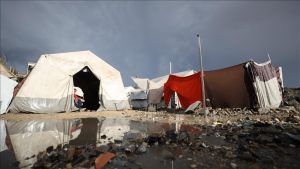 Jakarta, 25 Sha’ban 1434/4 July 2013 (MINA) – The Egyptian army’s suspension of the constitution and coup of President Mohamed Morsi has drawn mixed responses from world leaders, according international media reports:
Jakarta, 25 Sha’ban 1434/4 July 2013 (MINA) – The Egyptian army’s suspension of the constitution and coup of President Mohamed Morsi has drawn mixed responses from world leaders, according international media reports:
Indonesia
The Indonesian government is very much concerned with the latest developments we are watching in Egypt, Indonesian Foreign Minister Marty Natalegawa said.
“So far, Indonesian government has hoped that the process of democratic transition in Egypt would run well, orderly and peacefully. Presumably the situation in Egypt may soon recover and democratization process as what the Egyptian people wish will continue to roll .”
Also Read: British Activist Nears End of 6.5-Month Walk From UK to Istanbul to Support Palestinians
Palestine
Palestinian President in West Bank Mahmoud Abbas stated that he hoped Egypt would survive the latest crisis and emerge stronger, and he highlighted that Palestinians respect the will of the country and its people.
While Hamas-led government in Gaza express their fearless over military’s coup in Egypt but concerned only with the stability of the neighboring country.
“We only care about stability in Egypt regardless of who is in charge. Egypt is a lifeline to us; it’s a major factor in the stability of the internal Palestinian situation — it is our backbone,” Ahmed Yousef added. He hoped a political solution could be found for the crisis and lead Egypt to the “shore of safety.”
Also Read: Türkiye Urges Israel to Match Hamas’ Constructive Steps Toward Permanent Gaza Ceasefire
United Kingdom
Britain urged for calm in Egypt following the army’s ouster of Morsi and spoke out against the use of military intervention in bringing about regime change, but stopped short of calling it a coup.
“The situation is clearly dangerous and we call on all sides to show restraint and avoid violence,” said Foreign Secretary William Hague.
“The United Kingdom does not support military intervention as a way to resolve disputes in a democratic system,” Hague said in the statement.
Also Read: HRF Files Legal Complaint in Cyprus Against Israeli Soldier
Britain called on all parties to move forward and “show the leadership and vision needed to restore and renew Egypt’s democratic transition.”
“It is vital for them to respond to the strong desire of the Egyptian people for faster economic and political progress for their country,” stressed Hague.
This must involve early and fair elections and civilian-led government, he said.
“In the long run only democratic processes and government by consent will bring the stability and prosperity that the people of Egypt seek,” added the minister.
Also Read: Tensions with Lebanon’s Hezbollah, Israel to Recruit 12,000 Additional Soldiers
European Union
The European Union has called for a rapid return to democracy in Egypt.
“I urge all sides to rapidly return to the democratic process, including the holding of free and fair presidential and parliamentary elections and the approval of a constitution, to be done in a fully inclusive manner, so as to permit the country to resume and complete its democratic transition,” EU foreign policy chief Catherine Ashton said in a statement on Thursday.
France
Also Read: Hamas: Israeli President’s Africa Visit an Attempt to Undermine Support for Palestine
French Foreign Minister Laurent Fabius said on Wednesday that Paris took note that elections had been announced in Egypt following a transition period after the army ousted president Mohamed Morsi.
“In a situation that has worsened seriously and with extreme tension in Egypt, new elections have finally been announced, after a transition period,” Fabius said in a statement.
Saudi Arabia
Saudi King Abdullah sent a message of congratulations to the head of the Egyptian Constitutional Court, Adly Mansour, on Wednesday for being appointed interim head of state after the armed forces overthrew Morsi, the Saudi state news agency SPA reported.
Also Read: Indonesian Language Program Officially Opened at Al-Azhar University
“In the name of the people of Saudi Arabia and on my behalf, we congratulate your leadership of Egypt in this critical period of its history. We pray for God to help you bear the responsibility laid upon you to achieve the ambitions of our brotherly people of Egypt,” the message said.
United Arab Emirates
The United Arab Emirates welcomed the change in Egypt, according to state news agency WAM, and praised the Egyptian armed forces.
“His Highness Abdullah bin Zayed al-Nahayan, the foreign minister of the UAE, expressed his full confidence that the great people of Egypt are able to cross these difficult moments that Egypt is going through,” WAM said in a statement.
Also Read: Indonesia to Send Language Teachers to Al-Azhar University
United States
The United States declined on Wednesday to criticise Egypt’s military, even as it was ousting of Morsi from power.
Shortly after Egypt’s army commander announced that Morsi, the country’s first democratically elected president, had been deposed and the constitution suspended the US State Department expressed concern over the military intervention.
The US ordered the mandatory evacuation of its embassy in Cairo, just hours after the army deposed Morsi. A later travel advisory confirmed that “the Department of State ordered the departure of non-emergency US government personnel and family members from Egypt due to the ongoing political and social unrest.”
Also Read: Türkiye Issues Arrest Warrant for Netanyahu Over Gaza ‘Genocide’
US President Barack Obama released a statement saying he was deeply concerned by decision by Egyptian military to depose Morsi, and calls for a swift return to civilian government.
“No transition to democracy comes without difficulty, but in the end it must stay true to the will of the people. An honest, capable and representative government is what ordinary Egyptians seek and what they deserve,” Obama said.
“The long-standing partnership between the United States and Egypt is based on shared interests and values, and we will continue to work with the Egyptian people to ensure that Egypt’s transition to democracy succeeds.”
However, the US also stopped short of calling the military intervention a coup.
Also Read: Kazakhstan Confirms Joining Abraham Accords
Al Jazeera’s Patty Culhane, reporting from Washington, noted that any country involved in a coup was not entitled to aid from the US.(T/P03/E1)
Mi’raj News Agency (MINA)
Also Read: YouTuber Ms. Rachel Wears Gaza Children’s Artwork Dress at Glamour Magazine Awards


























 Mina Indonesia
Mina Indonesia Mina Arabic
Mina Arabic